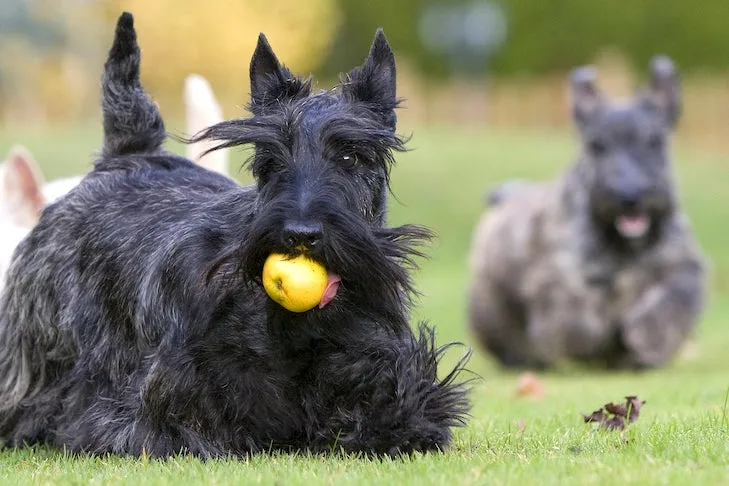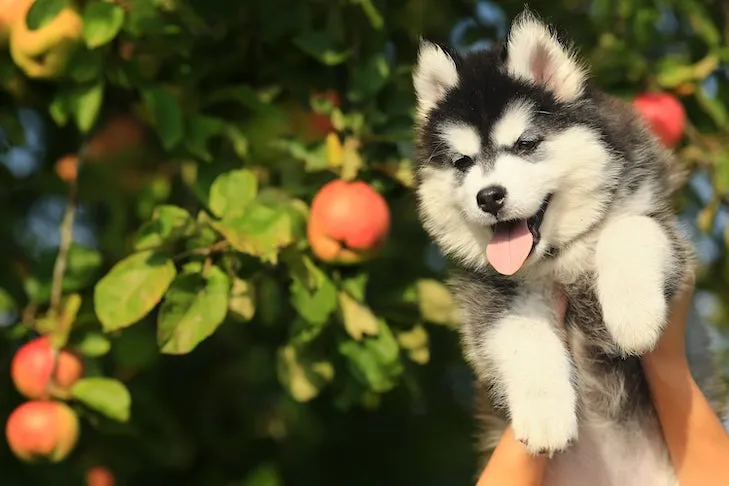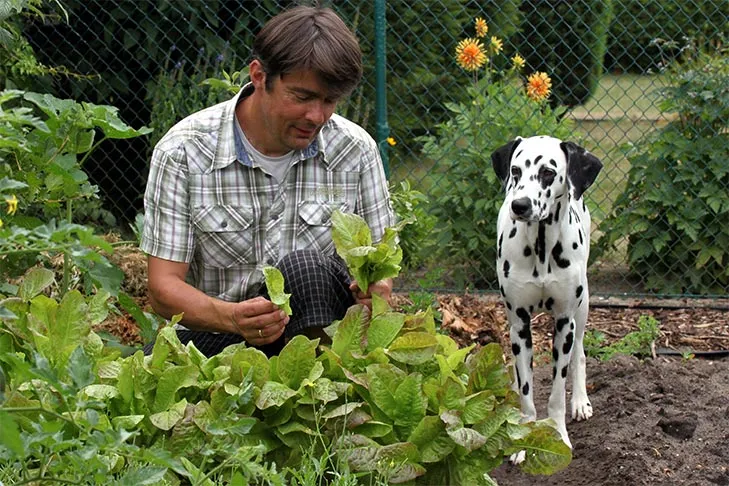It’s natural for dog owners to want to share their favorite snacks with their furry companions, especially when those snacks are healthy fruits. However, not all human foods are created equal in a dog’s digestive system. While many fruits offer beneficial vitamins and fiber, some contain compounds that are highly toxic, posing serious health risks and even being fatal to dogs. Understanding what fruits can dogs not have is crucial for ensuring your pet’s safety and well-being.
Dogs process foods differently than humans, and even a small amount of a dangerous fruit can lead to severe health problems, ranging from gastrointestinal upset to organ damage. While dogs, as omnivores, don’t strictly need fruits as part of their diet, certain dog-safe fruits can be excellent, nutritious treats when given in moderation and prepared correctly. This guide will help you navigate the world of fruits for dogs, highlighting which ones are off-limits and which can be enjoyed safely. For a more comprehensive overview of harmful foods, you can refer to our guide on what foods can dogs can not eat.
Understanding Canine Digestion and Fruit Intake
Dogs have unique digestive systems that are designed to process a diet primarily consisting of protein and fat. While their bodies can handle some carbohydrates, including those found in fruits, the presence of certain sugars, seeds, pits, or even the fruit flesh itself can be problematic. Unlike humans, dogs don’t always have the enzymes to break down particular compounds, or their smaller body mass makes them more susceptible to toxins. This is why a fruit perfectly safe for you might be dangerous for your dog. Fruits should always be considered supplemental treats, making up no more than 10% of a dog’s daily caloric intake, and never a primary food source.
Fruits Dogs Absolutely Must Avoid
When considering what fruits can dogs not have, certain varieties top the list due to their highly toxic nature. These fruits should be kept entirely out of your dog’s reach to prevent potential poisoning and severe health complications.
Grapes & Raisins: A Critical Danger
Grapes and their dried form, raisins, are perhaps the most notorious fruits on the “do not feed” list for dogs. The exact toxic substance is still unknown, but even a small amount can cause acute kidney failure in dogs, regardless of breed, age, or sex. The severity of the reaction can vary, but the risk is always high, making grapes and raisins an absolute no-go.
Symptoms of grape/raisin toxicity: Vomiting, diarrhea, lethargy, dehydration, loss of appetite, abdominal pain, and decreased urine production. These symptoms can appear within hours or up to several days after ingestion.
What to do: If you suspect your dog has eaten any amount of grapes or raisins, contact your veterinarian or a pet poison control center immediately. Time is critical for effective treatment. Ensure all grape-containing products, including fruit salads, baked goods, and even compost heaps, are inaccessible to your dog.
Cherries: The Cyanide Threat
With the exception of the ripe, fleshy fruit around the seed, all parts of the cherry plant – including the stems, leaves, and particularly the pits – contain cyanide. Cyanide is a potent toxin that disrupts cellular oxygen transport, meaning your dog’s blood cells cannot carry enough oxygen, leading to potentially fatal consequences. While the flesh of a cherry is generally not considered toxic, the risk of a dog ingesting the pit, which is a choking hazard and contains cyanide, makes them too dangerous to offer.
Symptoms of cyanide poisoning: Dilated pupils, difficulty breathing, bright red gums (due to blood struggling to carry oxygen), and shock.
What to do: If your dog has eaten whole cherries or cherry pits, seek emergency veterinary care immediately. Always remove pits completely if you happen to share the flesh, and ensure discarded pits are in a dog-proof trash can. Consider cherry-flavored dog treats as a safer alternative if your dog enjoys the taste.
Avocados: The Persin Problem
While a popular superfood for humans, avocados should be avoided by dogs. The pit, skin, and leaves of the avocado plant contain persin, a fungicidal toxin that can cause vomiting and diarrhea in dogs. Although the fleshy part of the avocado contains less persin, it can still be enough to cause gastrointestinal upset, especially in sensitive dogs.
Beyond persin, avocado flesh is also high in fat. Ingesting too much fat can lead to an upset stomach, and in more severe cases, can contribute to pancreatitis, a serious inflammation of the pancreas. The large pit also presents a choking hazard or can cause an intestinal obstruction if swallowed.
Symptoms: Vomiting, diarrhea, abdominal pain, and lethargy.
What to do: Keep avocados and avocado products (like guacamole) away from your dog. If you’re looking to support your dog’s skin and coat health, consider dog treats that include avocado in the ingredients in a dog-safe formulation.
Tomatoes: Beware the Green Parts
Ripe, red tomato flesh is generally considered safe for dogs to eat in small quantities. However, the green parts of the tomato plant – including the leaves, stems, and unripe green tomatoes – contain a toxic substance called solanine. Solanine can be harmful to dogs if consumed in large amounts, causing gastrointestinal upset and neurological issues.
While a dog would typically need to ingest a significant quantity of the green plant material to become truly sick, it’s safer to avoid feeding tomatoes altogether or to be extremely cautious, offering only fully ripe, red flesh with no stems or leaves attached.
Symptoms of solanine poisoning: Vomiting, diarrhea, lethargy, weakness, dilated pupils, and in rare cases, central nervous system depression.
What to do: If you have a vegetable garden, ensure your dog cannot access your tomato plants. If your dog consumes green tomatoes or tomato plant parts, monitor them closely and consult your vet if symptoms appear.
Other Fruits to Approach with Caution
Even for fruits generally considered safe, there are often specific parts or preparation methods that render them unsafe. Always remove pits, seeds, and tough skins from any fruit before offering it to your dog. Many fruit seeds and pits, like those from apples and pears, contain traces of cyanide, similar to cherries, and can be choking hazards. Understanding these nuances is key to responsible pet ownership.
Fruits Dogs Can Enjoy (In Moderation!)
While focusing on what fruits can dogs not have is vital, it’s also great to know which fruits can be safely offered as a healthy, occasional treat. Always introduce new foods slowly and in small quantities to monitor for any adverse reactions.
Apples
Apples are an excellent source of vitamins A and C, as well as fiber, making them a healthy snack. They are low in protein and fat, which is great for senior dogs or those managing their weight.
Preparation: Always remove the seeds and core, as apple seeds contain small amounts of cyanide and the core can be a choking hazard. Cut the apple into bite-sized pieces.
Serving suggestion: Offer fresh, sliced apple. Frozen apple slices can be a refreshing treat on a warm day.
 Scottish Terriers playing in the grass.
Scottish Terriers playing in the grass.
Bananas
Bananas are a great low-calorie treat, rich in potassium, vitamins, biotin, fiber, and copper. They are also low in cholesterol and sodium.
Caution: Due to their high sugar content, bananas should only be given as an occasional treat and not a regular part of your dog’s diet, especially for dogs prone to weight gain or diabetes.
Serving suggestion: Offer small slices of ripe banana. You can also mash a small amount and mix it with their kibble or freeze small dollops for a cool treat.
Blueberries
Often called a superfood, blueberries are packed with antioxidants, which help prevent cell damage. They are also rich in fiber and phytochemicals.
Serving suggestion: Fresh or frozen blueberries can be offered as a treat. They are also a fun training reward, especially if you’re teaching your dog to catch treats in the air.
Cantaloupe
This juicy melon is loaded with nutrients, low in calories, and a good source of water and fiber.
Caution: Cantaloupe is high in sugar, so it should be given in moderation, particularly to overweight dogs or those with diabetes.
Preparation: Remove the rind and seeds before offering.
Serving suggestion: Cut into small cubes. Frozen cantaloupe cubes make a delightful summer snack.
Cranberries
Both fresh and dried cranberries are safe for dogs in small quantities. They are known for their antioxidant properties.
Caution: Many commercially dried cranberries are heavily sweetened, adding unnecessary sugar to your dog’s diet. Opt for unsweetened fresh or frozen cranberries if possible. Too many can cause an upset stomach.
Serving suggestion: A few fresh or unsweetened dried cranberries.
Cucumbers
Cucumbers are an excellent snack for dogs, particularly overweight dogs, as they are very low in carbohydrates and fat, and full of hydrating water. They provide vitamins K, C, and B1, as well as potassium, copper, magnesium, and biotin.
Serving suggestion: Sliced or diced cucumber can be a crisp, refreshing treat. Frozen slices can be a fun enrichment snack.
 Dog cucumber
Dog cucumber
Mango
This sweet tropical fruit is a good source of vitamins A, B6, C, and E, along with potassium, beta-carotene, and alpha-carotene.
Preparation: Always remove the hard pit and the skin before serving. The pit is a choking hazard and contains small amounts of cyanide. The skin can be difficult to digest.
Caution: Mango is high in sugar, so offer it in moderation.
Serving suggestion: Cut into small, bite-sized pieces.
Oranges
Oranges are safe for dogs to eat in small amounts, providing vitamin C, potassium, and fiber. However, many dogs are not keen on the strong citrus smell and taste.
Preparation: Only offer the juicy flesh of the orange, making sure to remove all seeds and the peel. Orange peel can be rough on their digestive system, and the oils in the peel can cause stomach upset.
Serving suggestion: A small segment or two of peeled, deseeded orange.
Peaches
Fresh or frozen peaches, when properly prepared, are a good source of fiber and vitamin A.
Preparation: Crucially, the pit of a peach contains cyanide and must be completely removed and discarded safely. Do not offer canned peaches, as they are often packed in sugary syrups which are unhealthy for dogs.
Serving suggestion: Cut fresh peach flesh into small, safe chunks. Frozen peach slices can be a cool, refreshing treat.
 Siberian Husky puppy being held up in front of an apple tree.
Siberian Husky puppy being held up in front of an apple tree.
Pears
Pears are a healthy snack, high in copper, vitamins C and K, and fiber.
Preparation: Similar to apples, remove the core and seeds, as seeds contain traces of cyanide. Cut the pear flesh into bite-sized chunks. Avoid canned or jarred pears with added sugars.
Serving suggestion: Fresh, sliced pear.
Pineapple
A few chunks of pineapple can be a sweet, healthy treat for dogs. It’s rich in vitamins, minerals, and fiber, and contains bromelain, an enzyme that aids protein absorption.
Preparation: Always remove the prickly outside peel and the tough, fibrous crown first, as these can cause digestive upset or choking.
Caution: Avoid canned pineapple in sweetened syrups.
Serving suggestion: Small, fresh pineapple chunks.
Pumpkin
Pure pumpkin is a highly beneficial food for dogs, known for its ability to relieve both diarrhea and constipation. It’s rich in antioxidants and fiber.
Preparation: Always use 100% pure pumpkin puree (not pumpkin pie filling, which contains spices and sugar). You can also roast and peel fresh pumpkin.
Serving suggestion: Mix a spoonful of pure pumpkin puree into your dog’s food, or offer it as a special treat. There are also many pumpkin supplements formulated for dogs.
Raspberries
Raspberries are safe for dogs in moderation. They contain antioxidants, are low in sugar and calories, and high in fiber, manganese, and vitamin C. Their anti-inflammatory properties can be beneficial for aging joints.
Caution: Raspberries contain small, naturally occurring amounts of xylitol, an artificial sweetener that is highly toxic to dogs in larger quantities. While the amount in raspberries is minimal, it’s wise to limit your dog to no more than 8 ounces (about a cup) of fresh or frozen raspberries to be safe.
Serving suggestion: A few fresh or frozen raspberries.
Strawberries
Strawberries are full of fiber and vitamin C, and also contain an enzyme that can help whiten your dog’s teeth.
Caution: Like all fruits, strawberries contain natural sugar, so offer them in moderation to prevent unnecessary caloric intake.
Serving suggestion: Fresh or frozen strawberries, cut into appropriate sizes.
 Pembroke Welsh corgi and strawberry
Pembroke Welsh corgi and strawberry
Watermelon
Watermelon is a hydrating treat, especially on hot days, as it’s 92% water. It provides vitamins A, B-6, and C, as well as potassium.
Preparation: It is crucial to remove the rind and all seeds before feeding watermelon to your dog. The rind can cause gastrointestinal upset, and seeds can lead to intestinal blockage.
Serving suggestion: Seeded, rind-free chunks of watermelon. Frozen chunks make an excellent hot-weather enrichment treat.
What About Vegetables? Safe & Unsafe Veggies for Your Dog
While the focus here is on what fruits can dogs not have, it’s also important for dog owners to be aware of which vegetables are safe and unsafe. Many vegetables can offer great nutritional benefits, but some pose similar risks to certain fruits. For information on specific dietary needs based on breed, check out what can German Shepherds eat and not eat.
Safe Vegetables for Dogs
Many vegetables can be a healthy, low-calorie addition to your dog’s diet when prepared correctly.
- Broccoli: Safe in small amounts as an occasional treat. It’s high in fiber and vitamin C. However, broccoli florets contain isothiocyanates which can cause gastric irritation, and tough stalks can be a choking hazard. Best served cooked and in very small pieces.
- Brussels Sprouts: Packed with nutrients and antioxidants. Give in moderation, as they can cause gas.
- Carrots: An excellent low-calorie snack, high in fiber and beta-carotene (which produces vitamin A). The crunching action can also benefit dental health.
- Celery: Contains vitamins A, B, and C, and nutrients that support heart health. It can also help freshen doggy breath.
- Green Beans: Chopped, steamed, raw, or canned (plain, no-salt) green beans are safe. They are full of vitamins, minerals, and fiber, and are low in calories.
- Peas: Green peas, snow peas, sugar snap peas, and garden peas are generally fine. They offer vitamins, minerals, protein, and fiber. Use fresh or frozen, avoiding canned peas with added sodium.
- Pumpkin: (Already covered above as a fruit, but often used as a vegetable substitute) – Great for digestive health.
- Spinach: Dogs can eat spinach, but it’s not the top choice. It contains oxalic acid, which can interfere with calcium absorption and potentially lead to kidney damage if consumed in very large quantities. While a small amount is unlikely to be harmful, other vegetables offer more straightforward benefits.
 Dalmatian watching a man gardening and picking leaves.
Dalmatian watching a man gardening and picking leaves.
Vegetables Dogs Should Never Eat
Just like with fruits, some vegetables are simply not safe or beneficial for dogs.
- Asparagus: While not toxic, asparagus offers little nutritional benefit to dogs. It’s tough when raw, and most nutrients are lost when cooked to a soft enough consistency for dogs to eat easily. There are better veggie options.
- Mushrooms: Wild mushrooms can be extremely toxic and even deadly to dogs. Never allow your dog to eat wild mushrooms. Washed, store-bought mushrooms (like button or cremini) are generally considered safe in small amounts, but it’s often safer to avoid them altogether unless you are certain of the species.
- Onions, Leeks, & Chives: These are part of the Allium family and are highly poisonous to most pets, especially cats and Japanese dog breeds (like Akitas and Shiba Inus), but all dogs are susceptible. They contain compounds that can damage a dog’s red blood cells, leading to hemolytic anemia.
Symptoms of onion toxicity: Vomiting, diarrhea, stomach pain, nausea, lethargy, weakness, pale gums, and increased heart and respiratory rates.
What to do: If your dog has ingested onions or related vegetables, contact your veterinarian immediately. Be vigilant about securing food containing onions, such as leftovers or sauces. For more guidance on specific issues, such as what can I feed a sick dog, always consult with your vet.
Key Takeaways for Feeding Fruits & Vegetables to Dogs
Responsible feeding means being informed about your dog’s dietary needs and potential dangers. When considering any human food as a treat for your dog:
- Research First: Always verify if a fruit or vegetable is safe for dogs before offering it.
- Moderation is Key: Even safe fruits and vegetables should only be given as occasional treats and in small quantities to avoid upsetting their digestive system or contributing to excessive sugar intake.
- Proper Preparation: Remove all pits, seeds, rinds, and stems. Cut food into small, bite-sized pieces to prevent choking hazards. Avoid any added sugars, salts, or spices.
- Monitor for Reactions: Introduce new foods slowly and observe your dog for any signs of digestive upset or allergic reactions.
- Consult Your Vet: If you have any doubts about a specific fruit or vegetable, or if your dog has an existing health condition (like diabetes or kidney issues), always consult your veterinarian before introducing new foods. They can provide personalized advice based on your dog’s individual needs.
- Secure Dangerous Foods: Ensure all toxic fruits, vegetables, and other harmful human foods are stored securely out of your dog’s reach.
 Rottweiler laying down in the yard, its head tilted.
Rottweiler laying down in the yard, its head tilted.
Conclusion
Understanding what fruits can dogs not have is a fundamental aspect of responsible pet ownership. While a variety of fruits can offer healthy and enjoyable treats for your canine companion, a critical distinction must be made between safe and toxic options. Grapes, raisins, cherries (with pits), and avocados are prime examples of fruits that pose serious, potentially life-threatening risks and should never be given to dogs. Even seemingly harmless fruits require careful preparation, ensuring pits, seeds, and rinds are removed.
Always prioritize your dog’s safety by educating yourself on canine nutrition and consulting with your veterinarian for any dietary questions. By being mindful of what you share and adhering to expert guidance, you can ensure your dog enjoys a healthy and happy life, free from the dangers of inappropriate human foods. For more insights into canine health and nutrition, explore other articles on Dog Care Story.
